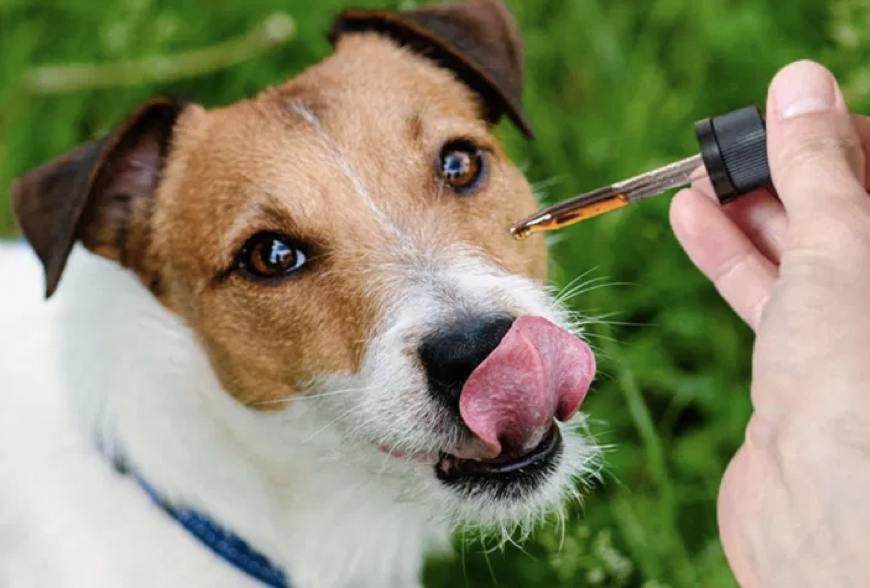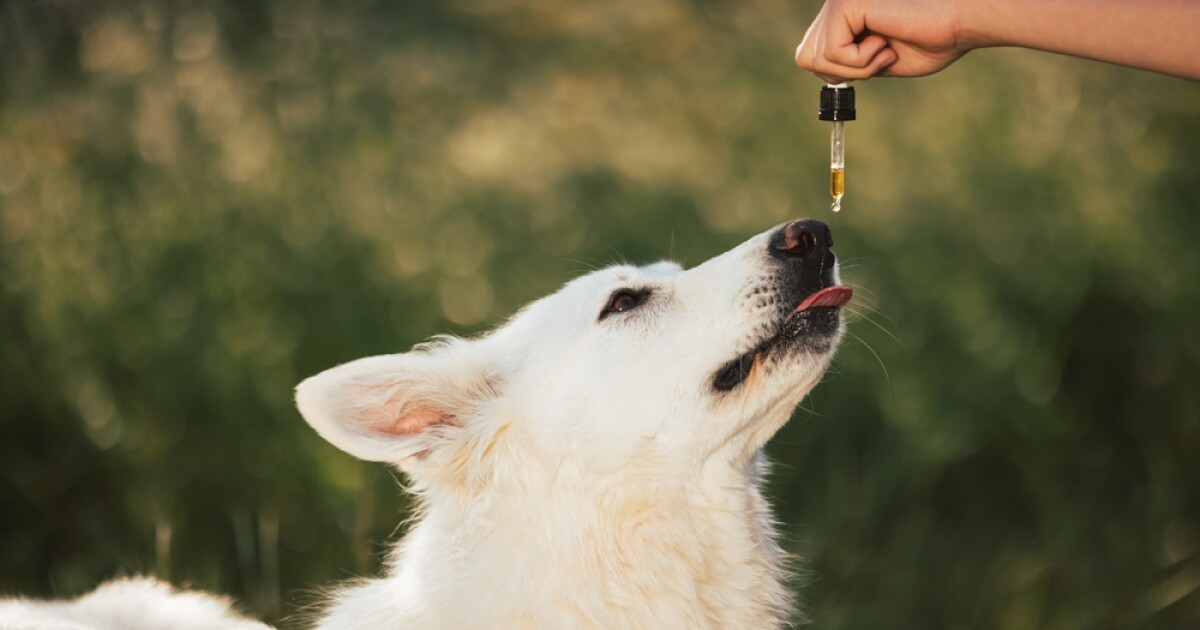Introduction
CBD (cannabidiol) oil has gained significant popularity in recent years, not only for human consumption but also for pets, especially dogs. As pet owners become more aware of alternative health options, CBD oil for dogs has emerged as a potential solution for various canine health issues. In this comprehensive guide, we will explore what you need to know about CBD oil for dogs, including its benefits, risks, legality, and how to use it effectively.

Understanding CBD Oil
CBD oil is a non-psychoactive compound derived from the cannabis plant. It’s important to note that CBD oil does not contain THC (tetrahydrocannabinol), the psychoactive component of cannabis responsible for the “high” sensation in humans. CBD interacts with the endocannabinoid system, which is present in both humans and dogs. This system helps regulate various physiological processes, such as pain perception, mood, and immune function.
Potential Benefits for Dogs
CBD oil for dogs is believed to offer several potential benefits, including:
- Pain Relief: CBD may help manage pain and discomfort associated with conditions such as arthritis, injuries, or surgery.
- Anxiety and Stress Reduction: Many dogs suffer from anxiety and stress, particularly in situations like thunderstorms, separation, or fireworks. CBD may promote relaxation and reduce anxiety in such cases.
- Anti-Inflammatory Effects: CBD’s anti-inflammatory properties may help alleviate symptoms of inflammatory conditions, including allergies and skin irritations.
- Seizure Management: CBD has shown promise in reducing the frequency and severity of seizures in dogs with epilepsy.
- Improved Appetite: Some dogs may experience a loss of appetite due to illness or medication side effects. CBD can stimulate appetite and improve food consumption.
- Anti-Nausea: CBD may help alleviate nausea and vomiting in dogs, especially those undergoing chemotherapy or suffering from digestive issues.
Choosing the Right CBD Oil
Not all CBD oils are created equal, and it’s crucial to select a high-quality product for your dog’s well-being. Here are some factors to consider when choosing the right CBD oil:

- Source and Quality: Opt for CBD oil derived from organic hemp plants. Look for products that undergo third-party testing to ensure purity and potency.
- Full-Spectrum vs. Isolate: Full-spectrum CBD contains a wide range of cannabinoids and terpenes, which may enhance the therapeutic effects through the entourage effect. CBD isolate contains only pure CBD.
- Dosage: The appropriate dosage of CBD for your dog depends on factors such as their size, weight, and the specific condition being treated. Consult with a veterinarian for dosage guidance.
- Form of Administration: CBD oil can be administered orally or added to your dog’s food. Some dogs may prefer treats infused with CBD.
- Avoid THC: Ensure that the CBD oil contains negligible THC content, as THC can be toxic to dogs.
Potential Risks and Side Effects
While CBD is generally considered safe for dogs, there are potential risks and side effects to be aware of:
- Dry Mouth: CBD may reduce saliva production, leading to increased thirst.
- Drowsiness: Some dogs may experience mild drowsiness, especially when given higher doses.
- Diarrhea: In some cases, CBD oil may cause gastrointestinal upset or diarrhea. Adjusting the dosage can help alleviate this side effect.
- Drug Interactions: CBD can interact with certain medications, so consult with a veterinarian if your dog is on other medications.
- Quality and Purity: Low-quality CBD products may contain harmful additives or contaminants, so it’s crucial to choose reputable brands.
- Legal Concerns: The legality of CBD for pets varies by location, so be sure to check local regulations.
How to Administer CBD Oil to Your Dog
Administering CBD oil to your dog can be done in several ways:
- Oral Administration: Using a dropper, place the recommended dosage of CBD oil under your dog’s tongue or along the gums. This allows for faster absorption.
- Mixing with Food: You can mix CBD oil with your dog’s food or treats. This method may take longer to produce effects but can be more convenient for some dogs.
- CBD Treats: Many companies offer CBD-infused dog treats or chews, which make it easy to provide a precise dosage.
- Capsules: CBD capsules can be given whole or opened and mixed with food.
- Topical Application: For localized issues such as skin irritations, some CBD balms or creams can be applied directly to the affected area.
- Gradual Introduction: Start with a low dose and gradually increase it while monitoring your dog’s response. This helps you find the optimal dosage for your pet’s needs.
Understanding the Science Behind CBD for Dogs
To delve deeper into the effectiveness of CBD oil for dogs, it’s essential to understand the science behind it. CBD interacts with the endocannabinoid system (ECS), which plays a crucial role in maintaining homeostasis in the body. This system consists of receptors (CB1 and CB2) and endocannabinoids naturally produced by the body.
When CBD is administered to dogs, it interacts with these receptors, influencing various physiological processes. For example:
- Pain Relief: CBD can modulate pain perception by interacting with CB1 receptors, providing relief from chronic pain or discomfort caused by conditions like arthritis or injuries.
- Anxiety Reduction: CBD may reduce anxiety by acting on both CB1 and CB2 receptors, promoting relaxation and a sense of calm in anxious dogs.
- Anti-Inflammatory Effects: CBD’s interaction with CB2 receptors can help reduce inflammation, making it beneficial for dogs with conditions like allergies or skin irritations.
- Seizure Management: While the exact mechanisms are still being studied, CBD’s impact on the ECS seems to reduce the frequency and intensity of seizures in epileptic dogs.
- Appetite Stimulation: CBD can influence appetite by interacting with CB1 receptors, which may help increase food intake in dogs with a reduced appetite.
The Importance of Quality Control
One of the critical factors when considering CBD oil for your dog is quality control. The CBD market is flooded with products of varying quality, so it’s vital to prioritize safety and efficacy. Reputable CBD manufacturers undergo rigorous testing processes to ensure their products are free from contaminants and accurately labeled.
Look for CBD products that offer:
- Third-Party Testing: Reliable brands provide lab results from independent third-party testing, confirming the CBD content and verifying the absence of harmful substances.
- Organic Hemp Sources: Opt for CBD oil derived from organically grown hemp plants to minimize the risk of exposure to pesticides and other chemicals.
- Transparent Labeling: Choose products with clear and accurate labels that specify the CBD concentration and dosage recommendations.
- No THC or Trace Amounts: Ensure that the CBD oil contains minimal to no THC, as dogs are sensitive to its psychoactive effects.
Monitoring Your Dog’s Response
Once you’ve selected a high-quality CBD product and consulted with your veterinarian, it’s essential to monitor your dog’s response to the treatment. Keep a journal or record of your dog’s behavior, symptoms, and any changes you observe. This information can help you and your vet determine the effectiveness of the CBD regimen and make necessary adjustments to the dosage or treatment plan.
Remember that CBD’s effects can vary from dog to dog, and finding the right dosage may require some trial and error. Patience and careful observation are key to achieving the desired results.
Consulting with a Veterinarian
Before starting your dog on a CBD regimen, it’s crucial to consult with a veterinarian. A vet can provide guidance on dosage, potential interactions with existing medications, and help you address any specific health concerns your dog may have. Additionally, veterinarians can recommend reputable CBD brands and monitor your dog’s progress.
Legality and Regulations
The legal status of CBD for pets can vary by location and is subject to change. As of my knowledge cutoff date in January 2022, many countries and states in the United States have legalized the use of CBD for pets, provided it contains less than 0.3% THC. However, regulations can change, so it’s essential to stay informed about the laws in your area.
Conclusion
CBD oil for dogs has shown promise in providing various health benefits and improving the overall well-being of our furry companions. However, it’s essential to approach it with caution, consult with a veterinarian, and choose high-quality products from reputable sources. With the right guidance and careful administration, CBD oil may offer a natural and effective solution for addressing various health concerns in dogs while enhancing their quality of life. Always prioritize your pet’s safety and well-being when considering any form of treatment.

